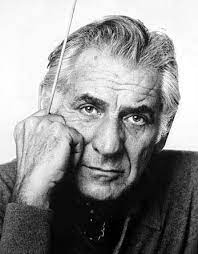Introduction:
Bradley Cooper’s latest venture into the world of biopics has sparked conversations and curiosity around the life of Leonard Bernstein, the iconic midcentury American conductor. “Maestro,” directed and co-written by Cooper, takes us on a journey through Bernstein’s multifaceted life, exploring the tensions between his committed marriage to actress Felicia Montealegre, his complex sexual identity, and the duality of his roles as a celebrated conductor and a serious composer.

Exploring Tensions in Bernstein’s Life:
The film dives deep into the primary tension of Bernstein’s personal life—his marriage to Felicia Montealegre contrasted against his complex relationships with men. It also sheds light on the secondary tension between his public persona as a conductor, relishing acclaim, and the private solitude he craved as a composer. A third tension emerges between the success of his acclaimed musicals and his aspiration for recognition in the realm of serious symphonic compositions.
Notable Figures and Relationships:
Cooper’s film takes a unique approach in presenting notable figures from Bernstein’s life on a “if you know, you know” basis. The narrative introduces characters like Betty Comden, Adolph Green, and choreographer Jerome Robbins with a subtle touch, leaving room for audiences to connect the dots. Notably, the portrayal of Aaron Copland, Bernstein’s mentor and occasional lover, adds depth to the narrative, albeit leaving some aspects unexplored.
Separating Fact from Fiction:
One notable incident in the film depicts a pivotal moment in Bernstein’s career—an unexpected opportunity to conduct the New York Philharmonic. While the film captures the essence of this event, it’s essential to note that Bernstein was not entirely unprepared, having been familiar with the season’s scores and receiving some coaching from the ailing regular conductor.
Addressing Controversies:
The film faced some controversy regarding Bradley Cooper’s prosthetic nose, with claims that it perpetuated stereotypes. However, closer inspection reveals that the prosthetic’s size is accurate to Bernstein’s actual nose. The portrayal, albeit visually impactful, raises questions about the balance between historical accuracy and cinematic aesthetics.
The Complex Marriage of Leonard and Felicia:
The film portrays the marriage of Leonard Bernstein and Felicia Montealegre with a focus on their deep connection and understanding. While the general outlines align with reality, some crucial moments, such as Felicia marrying Bernstein on the rebound, add complexity to their relationship. The film captures their evolving dynamics, leading to a separation prompted by Bernstein’s public indiscretions.
Exploring Bernstein’s Acceptance of His Sexual Orientation: “
Maestro” suggests that Bernstein fully accepted his sexual orientation, embracing diversity in the face of societal norms. However, historical records indicate Bernstein sought psychoanalysis and struggled with his preferences. The film might oversimplify this aspect of his life, failing to fully capture the internal conflicts he faced.

Conclusion:
In unraveling the intricacies of Leonard Bernstein’s life, “Maestro” presents a compelling narrative, albeit with some liberties taken for cinematic effect. Cooper’s film explores the tensions within Bernstein’s personal and professional spheres, offering audiences a glimpse into the complex life of a musical maestro. As we navigate through the film’s portrayal of facts and fictions, it becomes clear that the true beauty lies in the unresolved contradictions that defined Leonard Bernstein.
FAQs:
Q1: How accurate is Bradley Cooper’s portrayal of Leonard Bernstein’s early career?
A1: While the film captures the essence, certain details, like Bernstein’s level of preparation for a significant performance, may be slightly dramatized for cinematic effect.
Q2: Did Leonard Bernstein fully embrace his sexual orientation as portrayed in the film?
A2: The film suggests full acceptance, but historical records indicate Bernstein sought psychoanalysis, revealing a more nuanced struggle with his preferences.
Q3: How accurate is the depiction of Bernstein’s marriage to Felicia Montealegre?
A3: While the film captures the essence of their deep connection, certain moments, such as Felicia marrying Bernstein on the rebound, add complexity to their relationship.